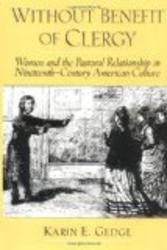Description
Karin Gedge's book, Without Benefit of Clergy, examines the pastoral relationship between women and clergymen in nineteenth-century American culture. Gedge finds that, while the answer was often negative, women did seek out pastoral guidance. Gedge supports her conclusion with evidence from a wide range of sources, including pastoral manuals, seminary students' and pastors' journals, women's diaries and letters, pamphlets, sentimental and sensational novels, and The Scarlet Letter.
The common view of the nineteenth-century pastoral relationship--found in both contemporary popular accounts and 20th-century scholarship--was that women and clergymen formed a natural alliance and enjoyed a particular influence over each other. In Without Benefit of Clergy, Karin Gedge tests this thesis by examining the pastoral relationship from the perspective of the minister, the female parishioner, and the larger culture. The question that troubled religious women seeking counsel, says Gedge, was: would their minister respect them, help them, honor them? Surprisingly, she finds, the answer was frequently negative. Gedge supports her conclusion with evidence from a wide range of previously untapped primary sources including pastoral manuals, seminary students' and pastors' journals, women's diaries and letters, pamphlets, sentimental and sensational novels, and The Scarlet Letter.
